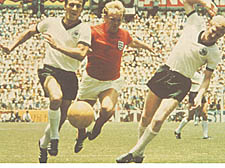
England lose on penalties to Germany at Euro 96

England take on the Germans in the 1970 World Cup in Mexico |
How Germany caught the English disease
Not so long ago football in Germany was derided and described as an 'English disease', writes John London
German Football: History, Culture, Society
Edited by Alan Tomlinson and Christopher Young Routledge, £24.99 order this book
It doesn’t seem too much of a surprise that the 2006 World Cup should take place in Germany. After all, the national team won the tournament in 1954, 1974 and 1990. They were European champions in 1972 and have continued to maintain a strong international presence.
If you step back a century the picture isn’t so clear. There were protests in Germany against what was called the “English disease” of soccer, considered a poor relative of German gymnastics. It was Austria, not Germany that created the first legitimate league on the Continent, in 1924. Even by the 1930s German football was still essentially an amateur affair, with under-the-table payouts compensating for genuine salaries. You can’t make much of a case for Nazi exploitation of the game, since there was still a degree of suspicion about its foreign origin. A 2-0 loss against Norway in the first round of the 1936 Olympics made a sad spectacle for the first match Hitler attended.
It was only in 1963 that the inaugural season of the national league, the Bundesliga, could be celebrated. Until fifteen years ago, communist East Germany had a separate footballing existence, so it is difficult to establish a fixed idea of what we have come to know as German prowess.
As this fascinating new book constantly shows, it’s all a question of politics. In one of the spicier chapters, co-editor Alan Tomlinson records the machinations that led to the choice of Germany for this year’s competition. The last time the World Cup took place in the country it can hardly be termed an unqualified success. Of the total number of tickets available in 1974, only 72 per cent were sold, and the figure went down to 47 per cent for the matches played in Berlin.
England’s bid against Germany for hosting the 2006 tournament pitted Bobby Charlton against Franz Beckenbauer. Unlike their encounter on the pitch in the 1966 final, this game was never going to be even. With support from the likes of supermodel Claudia Schiffer and Wimbledon champion Boris Becker and a reportedly clownish intervention from Tony Banks, Franz clinched the territory. No wonder Tomlinson predicts that ‘Kaiser’ Beckbenbauer will soon be president of FIFA.
In contrast to this triumph, the book contains other, insider views of German football. Some, like the rivalry between Schalke 04 and Bayern Munich, might be familiar. But did you know about the KirchMedia Company whose bankruptcy in 2002 led to a crisis from which many clubs are still struggling to survive? And what about the vibrant internet fan culture, strongly influenced by British developments?
Another British responsibility is recent German football literature, stimulated by ‘New Ladism’ and the German translation of Nick Hornby’s Fever Pitch. Unlike the meditations of our Arsenal man, the books by young German males usually see no tension between sex and football: the beautiful game can be played in both arenas.
The popular film The Miracle of Berne, released here two years ago, underlines just how important that 1954 victory in Switzerland became in the formation of post-war German identity. On the non-fictional political stage, the then Chancellor Schröder accepted a clod of earth from the Swiss stadium when it was demolished in 2001. He then gave the soil a special place in the garden of the German Chancellery.
While these are positive, if faintly ridiculous images, a grimmer picture emerges from the portraits of Stalinist East Germany.
Referees, trainers and players collaborated with the secret police, the Stasi, although officials were often unable to control crowds. By the time of the 1974 World Cup, an interesting test of loyalties arose: Did sporting patriotism involve supporting a dictatorship?
Candid reports from witnesses show no hesitation in claiming a distance from the regime, but a fidelity to the national team. In this context, it’s worth remembering that East Germany beat West Germany 1-0 in the first round.
An equally sensitive issue is racism. East German skinheads, active since the mid-1980s, may be a minority phenomenon. On the other hand, it’s depressing to read evidence that Turkish immigrants living in Germany – estimated at 2.5 million – are forming more teams of single ethnicity and that the so-called “melting-pot” of the Ruhr valley is really a myth.
Xenophobia persists in the media, although EU rulings have allowed German-born players to make up less than 50 per cent of the First Bundesliga. In the world of weekly international transfers, maybe hostile attitudes are merely a relic of outdated nationalism. Great players are now treated as international pop stars, not as the representatives of their countries.
At least there’s hope from the women’s game. The first team started as late as 1930. Sexist press reports in the 1950s contained descriptions of women covered in mud, but failed to mention the result. Yet by the 1980s the national women’s team kept winning European competitions with remarkable tenacity.
Meanwhile, a whole series of cultural projects are planned for 2006. The most bizarre include a danced representation of Brazil vs Germany, an acted theatre piece where the audience decides the score.
In the midst of this, Germany will be seeking to become the only footballing nation to win the championship as host on two occasions. And, if you’re after more than players’ biographies and gamblers’ tips, this book is the ideal companion to the social reality of football in the country we’ll all be watching so intently for the next month.
*
|









